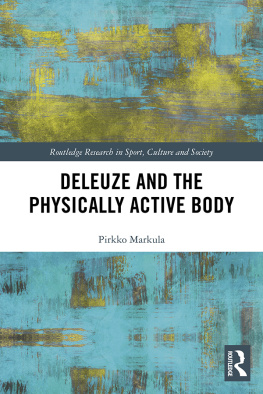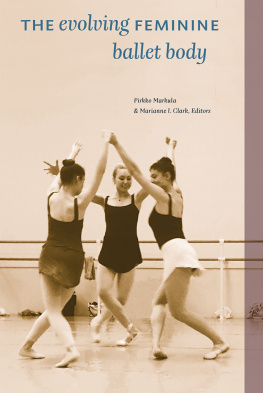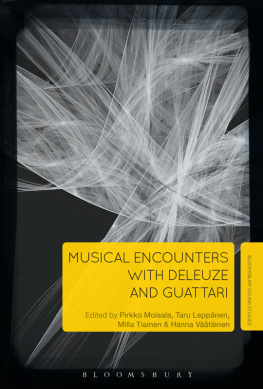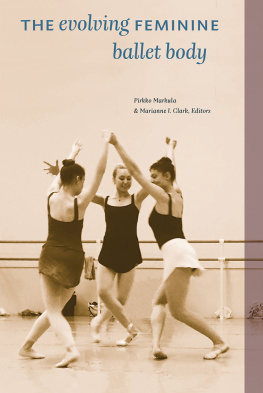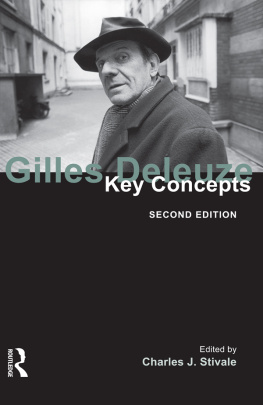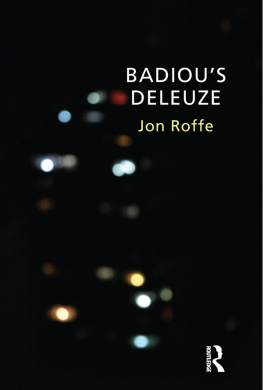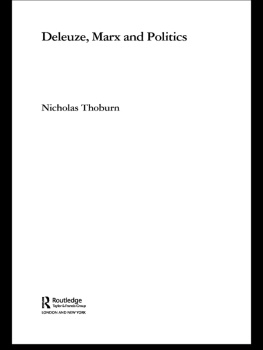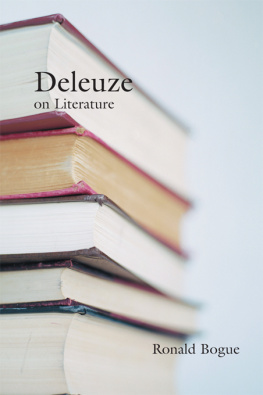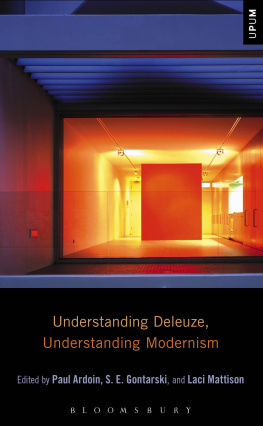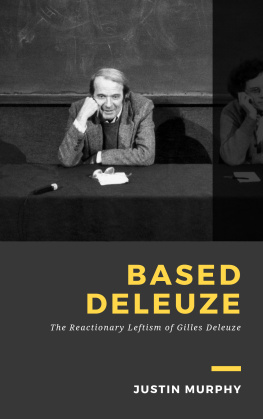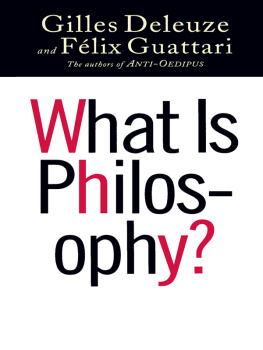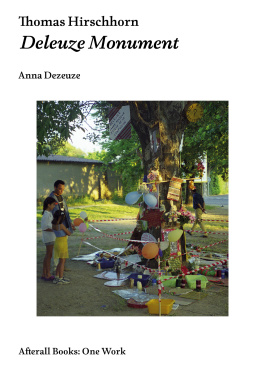Pirkko Markula - Deleuze and the Physically Active Body
Here you can read online Pirkko Markula - Deleuze and the Physically Active Body full text of the book (entire story) in english for free. Download pdf and epub, get meaning, cover and reviews about this ebook. year: 2019, publisher: Taylor and Francis, genre: Science. Description of the work, (preface) as well as reviews are available. Best literature library LitArk.com created for fans of good reading and offers a wide selection of genres:
Romance novel
Science fiction
Adventure
Detective
Science
History
Home and family
Prose
Art
Politics
Computer
Non-fiction
Religion
Business
Children
Humor
Choose a favorite category and find really read worthwhile books. Enjoy immersion in the world of imagination, feel the emotions of the characters or learn something new for yourself, make an fascinating discovery.
- Book:Deleuze and the Physically Active Body
- Author:
- Publisher:Taylor and Francis
- Genre:
- Year:2019
- Rating:5 / 5
- Favourites:Add to favourites
- Your mark:
- 100
- 1
- 2
- 3
- 4
- 5
Deleuze and the Physically Active Body: summary, description and annotation
We offer to read an annotation, description, summary or preface (depends on what the author of the book "Deleuze and the Physically Active Body" wrote himself). If you haven't found the necessary information about the book — write in the comments, we will try to find it.
Deleuze and the Physically Active Body — read online for free the complete book (whole text) full work
Below is the text of the book, divided by pages. System saving the place of the last page read, allows you to conveniently read the book "Deleuze and the Physically Active Body" online for free, without having to search again every time where you left off. Put a bookmark, and you can go to the page where you finished reading at any time.
Font size:
Interval:
Bookmark:

This volume examines Gilles Deleuzes philosophy as it relates to the study of the physically active body. It explores theoretical and practical examples of how the physically active body can be examined as a material, social, political, and cultural entity using a Deleuzian perspective.
Examining topics such as, the formation of thought within a capitalist system; sport, exercise, and dance as cultural arrangements; researching the physically active body from a Deleuzian perspective; and Deleuze on Foucault, this book shows ways of investigating the moving body as an agent for initiating social change.
This is fascinating reading for students and researchers working in the fields of the Sociology of Sport, Sport and Politics, and Sport and Social Theory.
Pirkko Markula is Professor of Socio-cultural Studies of Physical Activity at the University of Alberta, Canada. Her research interests include social analyses of dance, exercise, and sport in which she has employed several theoretical lenses ranging from critical, cultural studies research to Foucault and Deleuze. She is also a contemporary dancer and choreographer.
Routledge Research in Sport, Culture and Society
Gender Diversity in European Sport Governance
Edited by Agnes Elling, Jorid Hovden and Annelies Knoppers
Figurational Research in Sport, Leisure and Health
Edited by Dominic Malcolm and Philippa Velija
The Historical Sociology of Japanese Martial Arts
Ral Snchez Garca
Sport in Scandinavia and the Nordic Countries
Edited by Ken Green, Thorsteinn Sigurjnsson and Eivind srum Skille
Critical Research in Sport, Health and Physical Education
How to Make a Difference
Edited by Richard Pringle, Hkan Larsson and Gran Gerdin
Soccer and the American Dream
Ian Lawrence
Social Justice in Fitness and Health
Bodies Out of Sight
Laura Azzarito
The World Anti-Doping Code
Fit for Purpose?
Lovely Dasgupta
Deleuze and the Physically Active Body
Pirkko Markula
For more information about this series, please visit: www.routledge.com/sport/series/RRSCS
Pirkko Markula

First published 2019
by Routledge
52 Vanderbilt Avenue, New York, NY 10017
and by Routledge
2 Park Square, Milton Park, Abingdon, Oxon, OX14 4RN
Routledge is an imprint of the Taylor & Francis Group, an informa business
2019 Taylor & Francis
The right of Pirkko Markula to be identified as author of this work has been asserted by her in accordance with sections 77 and 78 of the Copyright, Designs and Patents Act 1988.
All rights reserved. No part of this book may be reprinted or reproduced or utilized in any form or by any electronic, mechanical, or other means, now known or hereafter invented, including photocopying and recording, or in any information storage or retrieval system, without permission in writing from the publishers.
Trademark notice: Product or corporate names may be trademarks or registered trademarks, and are used only for identification and explanation without intent to infringe.
Library of Congress Cataloging-in-Publication Data
A catalog record for this title has been requested
ISBN: 978-1-138-67673-2 (hbk)
ISBN: 978-1-315-54378-9 (ebk)
Typeset in Goudy
by Wearset Ltd, Boldon, Tyne and Wear
To Jim
I came to know Deleuzes work through Foucault. As a Foucauldian scholar of the physically active body, I was intrigued by Foucaults (1980) famous prediction that [p]erhaps one day this century will be known as Deleuzian (p. 165). Who was this thinker whom Foucault credited so very highly? I wondered. My initial fascination grew into a line of work that has evolved from a feminist critique of the narrow definitions of feminine and masculine bodies in physical activity to ethnographic works to change fitness industry practices. To recount how I decided to write an entire book on Deleuze, in what follows I briefly draw my trajectory in becoming a Deleuzian scholar of the physically activity body.
As a feminist researcher, I was introduced more closely to Deleuze by feminist scholars Rosi Braidotti, Claire Colebrook, Elizabeth Grosz, Dianne Currier, and Dorothea Olkowski. Their readings inspired my examination of feminine and masculine identity construction in sport. In my early work, for example, I (Markula, 2004) employed Deleuzes concept of becoming-woman to examine the devalued otherness of Victoria Beckham, the wife of famous English footballer David Beckham. I asserted that Deleuzes theory offered a positive site for the redefinition of female subjectivity within/through football (p. 160). Through a media reading, I attempted to identify how Victoria Beckham diverted from traditional femininity to conclude that she became woman, not through who she was, but through what her performing body did: dancing and singing. Victoria further magnified her performative effect, I argued, by creating an assemblage with Davids performing body. With her rather camp performance style, I concluded, Victoria broke down the limitations of femininity.
With Zoe Avner, I continued my feminist inspired work on identity formation with a reading of Finnish ski-jumper Matti Nyknen, a fallen superhero (Markula & Avner, 2013). Inspired particularly by Tamsin Lorraines (2008) work, we used Deleuzes concept of faciality trait to examine how Nyknens career was presented in the media. Our analysis demonstrated that Nyknen remained a media celebrity by oscillating between a masculine face (a dare-devil competitive athlete with multiple marriages, heavy drinking, and jail sentences) and a feminine face (careers as a singer and striptease artist). Although not a normal masculine face, Nyknen continued to appear in the media aligned with the majoritarian line of masculinity. While illustrating my continued development as a Deleuzian scholar, both of these works were based on media readings. As an ethnographer, Deleuzes belief that seeds for thinking differently can be found by examining the micro contexts of everyday life inspired me to experiment with how his rich, but complex, thought system might be used to inform research in such locations.
As a socio-cultural scholar of the active body, Deleuzes concept, the Body without Organs (BwO), attracted my attention since my earliest acquaintance with his work. Involving the body more closely into the research process seemed to hold great potential for thinking differently about how physical activity can be practiced more ethically. I (Markula, 2004) introduced the BwO that I, at the time, understood to denote the body before it becomes defined by science into an organism, already in my study of Victoria Beckham. The BwO, for me, represented the dismantling of a feminine identity, yet I argued, this did not mean a rejection of femininity, but a sensitivity to its micro-destratifications in society.
Thus, my conclusion that Victoria, through her performance of a stylized appearancea type of microstratification of femininitybroadened the definition of femininity in her cultural context. A deeper engagement with
Font size:
Interval:
Bookmark:
Similar books «Deleuze and the Physically Active Body»
Look at similar books to Deleuze and the Physically Active Body. We have selected literature similar in name and meaning in the hope of providing readers with more options to find new, interesting, not yet read works.
Discussion, reviews of the book Deleuze and the Physically Active Body and just readers' own opinions. Leave your comments, write what you think about the work, its meaning or the main characters. Specify what exactly you liked and what you didn't like, and why you think so.

